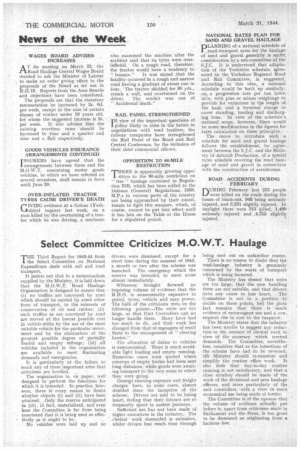Select Committee Criticizes M.O.W.T. Haulage T lIE Third Report for 1943-44
Page 18

If you've noticed an error in this article please click here to report it so we can fix it.
from the Select Committee on National Expenditure deals with rail and road transport.
It points out that in a memorandum supplied by the. Ministry, it is laid down that the M.O.W.T. Road Haulage Organization is designed to ensure that (i) no traffics are conveyed by road which should be carried by some other form of transport, in the interests of • conservation of oil and rubber; (a) such traffics as are conveyed by road are moved at the lowest possible cost in vehicle-miles by the use of the most suitable vehicle for the particular move-, ihent and by the elimination of the greatest possible degree of partially loaded and empty mileage; (iii) all vehicles included in the organization are available to meet fluctuating demands and emergencies.
It is particularly at the failure to reach any of these important aims that criticisms are levelled. , • The organization is, on paper, well designed to perform the functions for which it is intended. In practice, however, there is every reason to doubt whether objects (i) and (ii) have been attained...Only the reserve anticipated in (iii), in fact, materialized, and even here the Committee is far from being convinced that it is being used as effectively as it ought to be.
No vehicles were laid up and no drivers were dismissed, except for a short time during the summer of 1943, a month or two after the scheme was launched. The emergency which the reserve was intended to meet arose almost immediately.
Witnesses brought forward an imposing volume of evidence that the R.H.O. is unnecessarily expensive in petrol, tyres, vehicle and man power. The bulk of the criticisms rests on the following points:—The units are too large, so that Unit Controllers can no longer handle them. Many hive had too much to do, and their work has changed from that of managers of small fleets to the management of " clearing houses."
The allocation of duties to vehicles is uneconomical. There is much avoidable light loading and empty running. Numerous cases were quoted where convoys of empty lorries had been sent long distances, while goods were awaiting transport to the very areas to which they were going.
Generp running expenses and freight charges have, in some cases, almost doubled since the inception of the scheme. Drivers are said to be losing heart, feeling that their labours are so frequently spent in useless journeys.
Sufficient use has not been made of higher executives in the industry. The clerical work demanded is extensive, whilst drivers lose much time through.
being sent out on unfamiliar routes.
There is no reason to doubt that the road-haulage industry is genuinely concerned by the waste of transport which is being incurred.
The Ministry has denied that units are too large, that the mon handling them are not suitable, and that drivers have any cause to lose heart. The Committee is not in a position to decide on these points, but the plain fact remains that there is much evidence of extravagant use and a consequent rise in cost to the taxpayer.
The Ministry states that the industry has been unable to suggest any reduction in the amount of clerical work in view of the accuracy which control demands. The Committee, nevertheless, considers that as the intentions of the scheme have had ,to be reversed, thee Ministry should re-examine and simplify the routine office work. It also 'feels that day-to-day routine running is not satisfactory, and that a close scrutiny should be made of the work of the divisional and area haulage officers, and more particularly of the unit controllers, with a view to more economical use being made of lorries.
The Committee is of the opinion that the volume of evidence actually put before it, apart from criticisms made in Rarliament and the Press, is too great to be dismissed as originating from a factious few.




















































